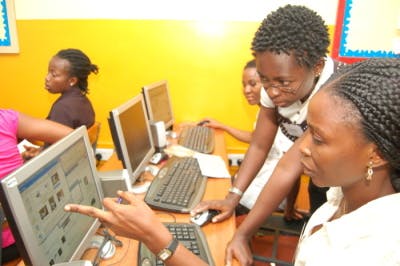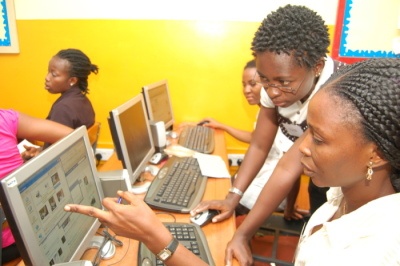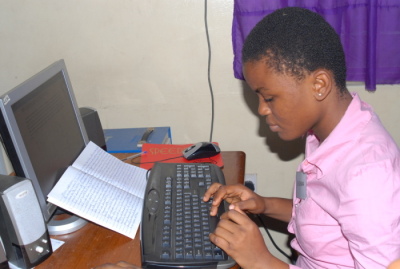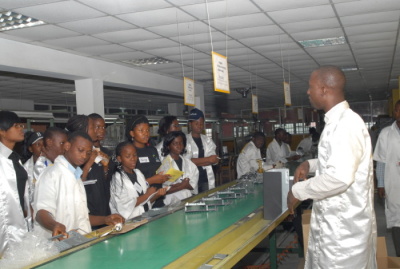W.TEC: Alleviating Poverty through Technology
Jan 21, 2015
First story




In one of my favourite books, Virginia Woolf (1) explains that it is important for women to have five hundred pounds a year and a room with a lock on the door (in other words, financial security and space for self-expression). And while Ms. Woolf was exploring the factors that contribute to success as a writer or poet, this analysis can apply to most other aspects of life. Poverty and lack of access to self-improvement opportunities routinely dis-empower women.
Statistics show that 70% of Nigerians live below the poverty line (2), the majority of who are women (3). Many Nigerian women lack access to basic education, decent nutrition, adequate health and social services. Cultural practices, which have their roots in deeply-entrenched patriarchal values, offer a restrictive model for women to live by. Lack of access to education, career support, political participation and mentors who demonstrate alternative paths push women into believing that the only way to live means frequently being denied of the opportunity to economic, social and political development.
I set-up the Women’s Technology Empowerment Centre – W.TEC in 2008 to change this situation by building the capacities of Nigerian girls and women, to increase their economic power and ability to speak about issues affecting their lives, through information and communication technology (ICT)-based training and projects.
Technology is a significant factor in a country’s development and growth, especially as acquiring, managing and using information through ICT becomes a more central aspect of modern societies. Available gender-disaggregated data shows Nigerian women’s use of ICT to be very low, which limits their participation in the technology-driven economy.
W.TEC believes that a holistic approach is required to create long-lasting impact, so our activities comprise of training, research, mentoring, career counselling and work placement. Through training, women acquire technology skills and knowledge that can be used to earn. This is complemented by activities that build professional and support networks, which increase women’s confidence using technology.
W.TEC has educated 230 women and girls since inception. The Young Women’s Programme has showed women how to use ICTs to develop and advance themselves as professionals, leaders and change-makers in their communities. The women learnt skills like typing documents, taking and editing photographs, and designing posters, which has earned them some income. Our Women’s Programme supports women’s professional and entrepreneurial aspirations with trainings on business-planning, sourcing for loans, and information management using ICTs.
Some of our alumni have found employment through our network with industry. One example is W, who got a job as an administrative assistant in an engineering firm, where she uses the computer skills she learnt with W.TEC. She is the breadwinner of her family, as her husband does not have a steady job.
Evaluations show that 58% of our alumni are using technology to promote their businesses, connect to economic opportunities, get information and educate about women’s rights. For the other women, access to computers is a challenge that W.TEC is addressing, through the opening of a Computer Café. The female-run Café will employ some of our alumni and provide income for them.
W.TEC’s Girls Technology Camp introduces teenage girls (mostly from economically disadvantaged backgrounds) to ICTs. Through classes, field trips and leadership workshops, they learn about computers, the relevance of ICTs to learning and work, and are encouraged to consider science and technology careers. All 30 graduates of the past 2 camps have indicated an interest in either pursing technology careers or using technology productively for their school work, and 2 have commenced technology degrees in university.
Our evaluations revealed that each alumnus shared her knowledge and skills with at least 2 other women or girls, thereby more than doubling our impact, which indicates that educating women has a multiplying effect. An example is D, who has trained 10 women in basic computer skills, which has helped them secure jobs.
Most importantly, W.TEC’s programmes are changing the mindsets and lives of a segment of women, their families and close social network. Our alumni have improved their financial standing, participated in political discourse using new technologies, been exposed to people and experiences outside of their local communities.
Learn more about our work at www.w-teconline.org.
References:
1. Woolf, V. 1928, A Room of One’s Own, Penguin Books, London, pp. 103 – 106.
CIA: The World Factbook (2010), Nigeria. Available from: www.cia.gov/library/publications/the-world-factbook/geos/ni.html [25 March 2010]
Adepoju, A. 2004, ‘Feminisation of Poverty in Nigerian Cities: Insights from Focus Group Discussions and Participatory Poverty Assessment’, African Population Studies, Vol. 19, No. Supplement A, 2004, pp. 141-154. Available from: www.bioline.org.br/pdf?ep04024 [25 March 2010]




